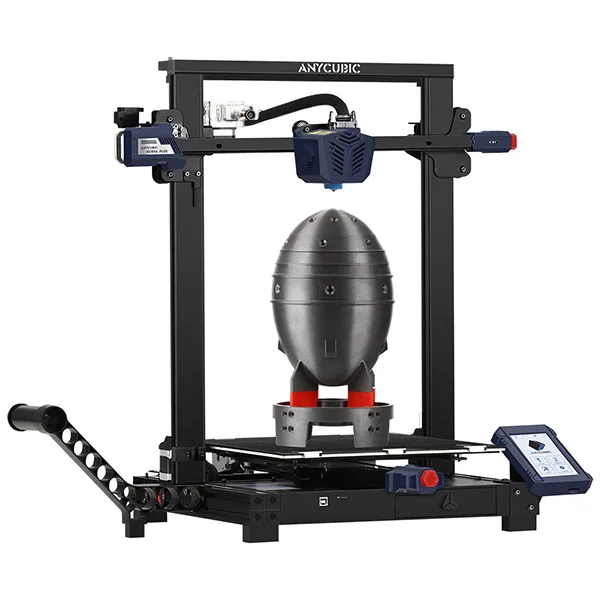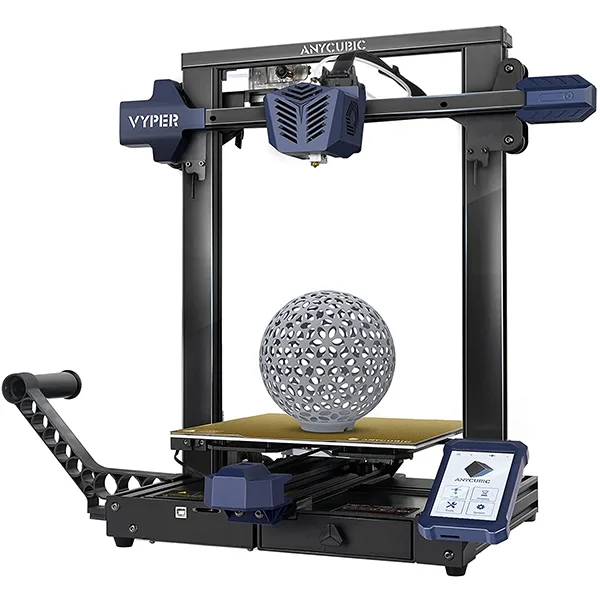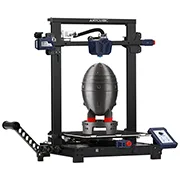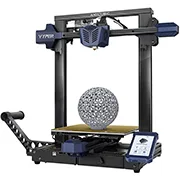The Anycubic Kobra Plus is essentially version two of the Vyper.
The Kobra Plus has 102% more build volume and a glass bed, but the remaining components are identical to those on the Vyper. Both of these printers have auto-leveling via a strain gauge, which on the Vyper has reports of it being prone to damage and needing routine replacement.
If you are looking to purchase a FDM printer, we recommend going with the regular Kobra or a Sovol SV06 for ~$250.
If you desire a larger build volume, similar to the Kobra Plus, we recommend the Sidewinder or SV03.
Anycubic Kobra Plus and Anycubic Vyper
- The Anycubic Kobra Plus and Vyper use a bowden extruder, which is ideal for fast printing but poor for retractions and flexible materials.
- Both printers have dual z-axis motors.
- The Anycubic Kobra Plus and Vyper use an internal strain gauge for auto-leveling, that has reports of it being prone to damage and needing replacement.
- Both printers come with a touch screen control interface.
- Both printers do not have an all-metal hotend, which means that the PTFE tube will begin to off-gas above 230°C. It is recommended to replace the heatbreak or hotend if you want to print at higher temperatures.
- What filaments can they print at 260°C? PLA, PETG, ABS, ASA, PP and flexibles like TPU.
- Both printers can be connected locally via SD Card and networked over USB. The Kobra Plus uses Micro-SD, while the Vyper uses regular SD cards.
Anycubic Kobra Plus
- The Anycubic Kobra Plus comes with a build volume of 300x300x350 mm, which is 102% larger in build volume than the Vyper.
- The Kobra Plus uses a carborundum glass bed that is clipped to the heat plate.

Kobra Plus Specifications
- Release Year: 2022
- Assembly: Partial
- Build Volume: 300 x 300 x 350 mm
- Extruder: Bowden
- PTFE-Lined: Yes
- Max Nozzle Temp: 230°C (260°C)1
- Max Bed Temp: 100°C
- Bed Material: Glass
- Auto-Leveling: Yes - Touch
- Z-Axis: Dual
- Connections: microSD & USB Type B
Anycubic Vyper
- The Anycubic Vyper comes with a build volume of 245x245x260mm.
- The Vyper uses a magnetic PEI steel sheet as the print surface.

Vyper Specifications
- Release Year: 2021
- Assembly: Partial
- Build Volume: 245 x 245 x 260 mm
- Extruder: Bowden
- PTFE-Lined: Yes
- Max Nozzle Temp: 230°C (260°C)1
- Max Bed Temp: 110°C
- Bed Material: PEI Spring Steel Sheet
- Auto-Leveling: Yes - Touch
- Z-Axis: Dual
- Connections: SD & USB Type B
Final Thoughts
Generally, we would not recommend either of these printers to new users. The bumps in build volume are favorable, but the potential for issues with the strain gauge leveling and the lack of a direct drive extruder is undesirable. Between the two, we would have to go for the Kobra Plus, only for the 102% extra build volume over the Vyper.
The regular Kobra is ≈$250, the extruder is direct drive, it uses the more reliable induction leveling, and has a magnetic PEI steel sheet for the print surface.
The Sidewinder and SV03 are reliable large build volume alternatives.
Disclaimer: You assume all responsibility and risk for the use of, but not limited to, the resources, advice, and opinions of 4D Filtration or its employees. 4D Filtration or its employees do not assume any liability or create any warranty for the use of any information. 4D Filtration may receive commissions for referral links. Prices are approximated for simplicity and they may fluctuate due to sales or markdowns. Amazon .com should refer you to your local amazon site if you are not in the United States; there is a chance Amazon's link redirect system will take you to a different product.

